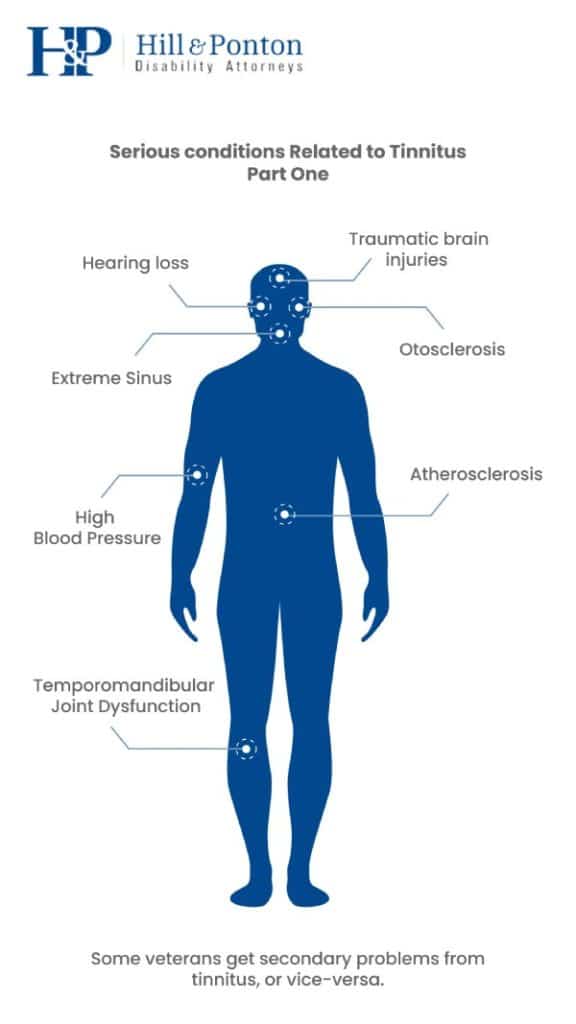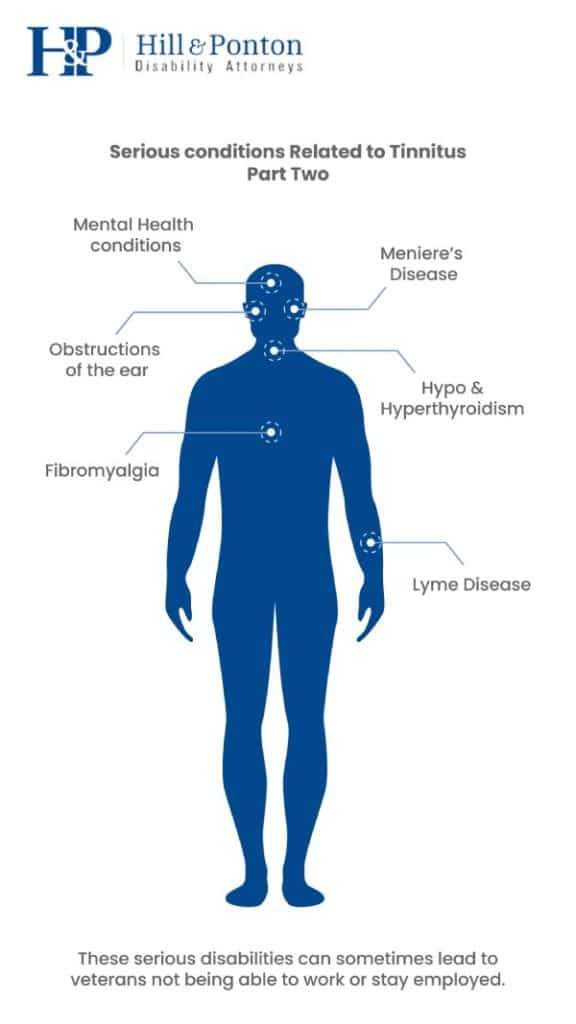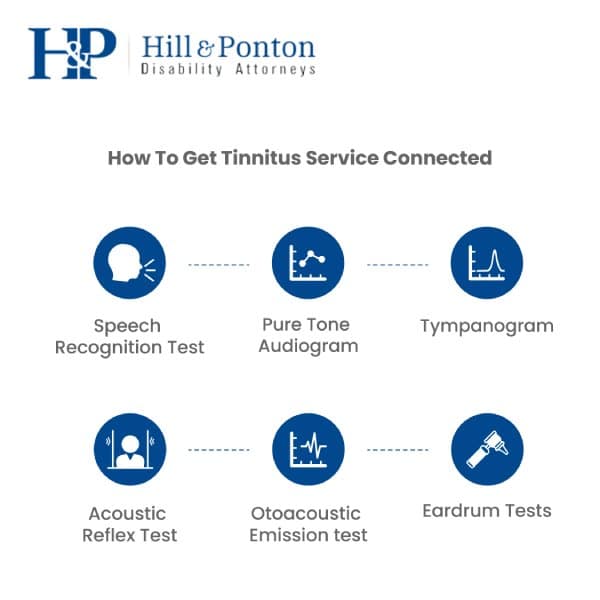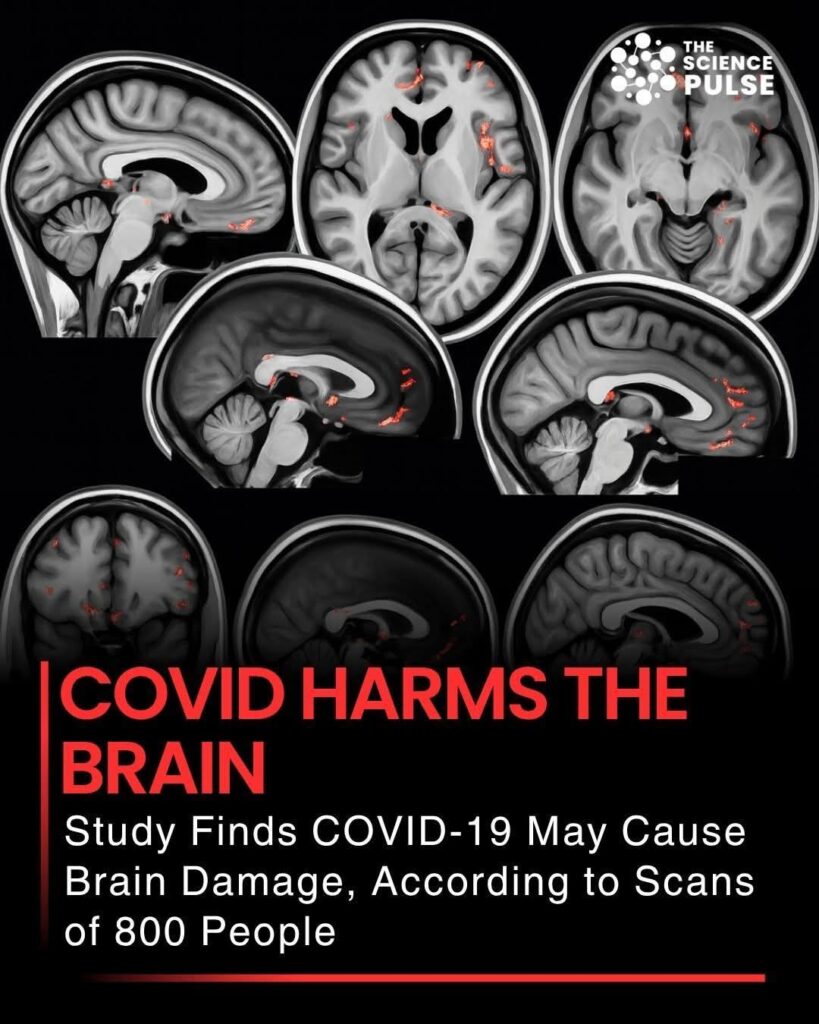For many veterans, the persistent sounds of tinnitus are a continuous reminder of their service sacrifices.
While tinnitus is the most claimed VA disability, it often results in just a 10% rating. However, when considering secondary conditions linked to tinnitus, a 100% rating is within reach! Read on to learn more.
This article delves into understanding tinnitus, its prevalence, and the potential path to a full VA disability rating.
Let’s explore how, with guidance like that from Hill & Ponton, veterans can navigate this complex claim process for the recognition they deserve.
Understanding Tinnitus: The Most Claimed VA Disability
Tinnitus, a condition many veterans are all too familiar with, remains at the forefront of VA disability claims.
But what is this condition that so many of our brave service members face?
What is Tinnitus?
Tinnitus is defined as the persistent perception of noise, such as ringing or buzzing, in the ears without any external source causing it.
It’s essential to understand that tinnitus is a symptom, not a standalone disease.
It can manifest as a temporary disturbance, perhaps following exposure to loud noise, or be a long-term, relentless presence in one’s daily life.
Tinnitus is a condition that the VA rates under 38 CFR § 4.87, Schedule of Ratings – Ear, Diagnostic Code 6260.
What Causes Tinnitus?
The primary culprit behind tinnitus is exposure to loud noises, which can lead to auditory damage.
This damage often presents itself in various ways.
Some veterans describe it as a constant ringing in their ears, while others liken it to whistling, buzzing, swooshing, or even clicking.
The types of noise and the severity can vary greatly from one individual to another, but the underlying cause is often the same: damage to the auditory system.
The Rise of Tinnitus Claims among Veterans
Tinnitus isn’t just a fleeting concern.
A staggering 2,703,665 claims were made in 2022, according to the VA’s compensation report.
Its prominence is noteworthy, as it stands tall among other VA disabilities.
This rise underscores not only the severity of the condition but also the vast number of veterans it impacts.
As we delve further into the intricacies of tinnitus and the VA disability rating system, it’s evident that our veterans need and deserve comprehensive support for this significant ailment.
Secondary Conditions: The Path to 100% VA Disability Rating
While tinnitus is a distinct concern, it’s intrinsically tied to a myriad of other conditions.
Recognizing and addressing these secondary conditions is crucial in seeking a more comprehensive VA disability rating:
- Hearing Loss: Perhaps the most intuitive connection, tinnitus often goes hand-in-hand with varying degrees of hearing loss.
- TBI (Traumatic Brain Injury): A prevalent concern among veterans, TBI can exacerbate or even induce tinnitus symptoms.
- High Blood Pressure: There’s evidence suggesting a link between elevated blood pressure and tinnitus onset or severity.
- Meniere’s Disease: This inner ear condition can lead to vertigo and ringing in the ears.
- Mental Health Issues: Conditions such as anxiety , depression or Post Traumatic Stress Disorder (PTSD) can be intensified by or have a causal relationship with tinnitus.
- TMJ Pain: The temporomandibular joint, when affected, can contribute to tinnitus symptoms.
- Pressure-Related Conditions and Obstructions: Sinus pressure, earwax buildup, or other obstructions can be related to tinnitus onset or severity.
- Fibromyalgia
- Hypo and Hyperthyroidism
- Lyme Disease
- Atherosclerosis
- Otosclerosis
Given the interconnected nature of these conditions with tinnitus, understanding and addressing them is essential for a holistic approach to VA disability claims.
If you believe you’ve been inadequately rated for tinnitus and are experiencing other conditions that could be linked, it’s essential to take action. Reach out to us if you’ve faced denials regarding your claim and wanting to file for secondary conditions.



Medications Linked with Tinnitus
Another consideration is the potential role of medications in tinnitus onset or exacerbation.
Some drugs can harm the inner ear, leading to tinnitus or hearing loss.
These include:
- Certain antibiotics
- Some cancer medications
- Diuretics
- Quinine medications used for malaria or other health conditions
- Certain antidepressants
Veterans are encouraged to be vigilant about their medications, understanding potential side effects, and discussing concerns with healthcare professionals.
Being informed can be a crucial step in ensuring a comprehensive disability claim.
How Hill & Ponton Got 100% Disability Rating for a Veteran with Tinnitus
Hill & Ponton’s expertise has made a difference in many veterans’ lives. One such veteran from the artillery division suffered from tinnitus and related anxiety post-service. Initially given only a 10% rating for his tinnitus, he sought our help. Recognizing the full impact of his service-connected issues, including hearing loss and anxiety, we successfully advocated for him. Consequently, his rating was increased to 100%, truly reflecting his health challenges.
Navigating the VA Claim Process for Tinnitus
The VA claim process can be intricate and overwhelming.
However, armed with knowledge and the right approach, veterans can navigate this path more smoothly.

Diagnosis & Evaluation for Tinnitus
Upon suspecting tinnitus, the first step is seeking a medical diagnosis.
Several tests can determine the presence and severity of tinnitus, such as audiograms or auditory brainstem response (ABR) testing.
Additionally, veterans will be called for a C&P (Compensation and Pension) exam specific to tinnitus, which is instrumental in determining the VA disability rating.
The Challenge: Proving Tinnitus to the VA
Tinnitus poses a unique challenge – its subjective nature.
Since the noises are internal, only the individual can truly perceive them.
While VA does recognize tinnitus, the standards for disability are often based on accompanying hearing loss.
Thus, veterans may find it challenging to convey the extent of their discomfort or disruption.
Strengthening Your Tinnitus VA Claim
To bolster a tinnitus claim, it’s crucial to provide concrete evidence.
A nexus statement, which connects the onset or exacerbation of tinnitus to the service, is invaluable.
Additionally, veterans should provide proof of instances where they were exposed to loud noises during service, such as working near aircraft, artillery, or even certain machinery.
Essential evidence sources include service medical records, personal testimonies, lay statements from fellow service members, or anyone who can attest to the veteran’s condition during or post-service.
With the right evidence and approach, veterans stand a better chance of receiving a rating that truly reflects the gravity of their condition.
Reference<https://www.hillandponton.com/tinnitus-claimed-disability-va/



